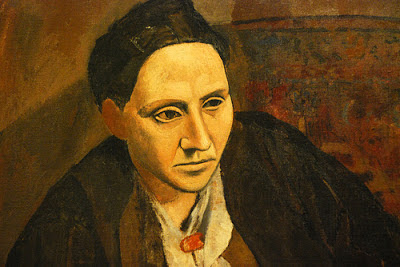.
The best way to remember
Iain Banks, who died yesterday morning at the far-too-young age of 59, is by reading one of his books. If you've never read it, I recommend the novel that first brought him to the astounded attention of the world --
The Wasp Factory. By some readings it's a horror novel, by others mainstream. And it's just a flat-out astonishing piece of writing. I say this as someone who is not a big fan of horror or of horror-related mainstream fiction.
Aside from the fact that it's relatively short and you can read it quickly, that's all I'm going to say about the book. You'll be happiest going into this one blind.
And while I'm at it . . .
In 1994 I wrote an essay titled "In the Tradition..." which praised many of the fantasists then working whom I deemed most worthy of praise. Here's an excerpt from it, in which I lauded Banks's
The Bridge. The word never appeared in the essay, but it occurs to me now that this was his Steampunk novel:
Iain Banks has the pleasant
distinction of simultaneously holding down two separate literary careers, one
as the mainstream author of such acclaimed works as
The Wasp Factory and
Canal
Dreams, and the other as an equally admired science fiction writer.
I'll confess that I don't know which hat Banks was wearing
when he wrote The Bridge. It hardly matters. What matters is the remarkable setting he has
chosen for the bulk of the book--an enormous and seemingly endless bridge
stretching from horizon to horizon across a nameless ocean. An entire society lives upon the bridge,
employing bicycles, rickshaws, and motorcycles for short-term transportation
and steam trains for longer voyages.
Here is the scene from a platform above the main train deck:
Over the noise of the milling people, the continual hisses and clanks, grindings and gratings, klaxons and whistles of the trains on the deck beneath sound like shrieks from some mechanistic underworld, while every now and again a deep rumble and a still more profound quaking and rattling announces a heavy train passing somewhere below; great pulsing clouds of white steam roll around the street and upwards.
Above, where the
sky ought to be, are the distant, hazily seen girders of the high bridge; obscured by the rising fumes and vapors, dimmed by the light intercepted outside them by their carapace of people-infected rooms and offices, they rise above and look down upon the rude profanity of these afterthought constructions with all the majesty and splendor of a great cathedral roof.
The first-person narrator is being treated for amnesia. He finds himself in a mannered society rather
like that of Freud's Vienna but riddled with small absurdities, not the least
of which is the total lack of curiosity its citizens display toward the bridge
itself. What lands does it connect? Who built it?
How old is it? Only the
protagonist cares, and he cannot find out.
His sporadic search for answers is the chief of three
alternating narratives. The second
follows the life and difficult romance of a (young, at first) man in
contemporary Scotland, and the third . . . well, it can only be characterized
as the adventures of Conan the Glaswegian.
At first the farcical adventures of a nearly brainless
swordsman with an overintellectualized familiar and a truly hideous accent
("I luv the ded, this old basturt sez to me when I wiz tryin to get some
innfurmashin out ov him. You fuckin old
pervert I sez, gettin a bit fed up by this time enyway, and slit his throate;
ah askd you whare the fukin Sleepin Byootie woz, no whit kind of humpin you
like. No, no he sez, splutterin sumthin
awfy and gettin blud all ovir ma new curiearse, no he sez I sed Isle of the
Dead" and so on) seem jarring and even intrusive. There are moments in the main narration when
the fabric of reality wears thin and opens a window into the second
plot-line. But this barbarian stuff is
straight out of left field.
These segments are so engaging, however, so funny in an
awful way, that the reader comes to accept them while doubting they'll ever
quite make sense.
The Bridge is,
underneath all, a novel of psychological revelation. So I am forced to be a little coy about the
plot. In broad terms, it is about the
protagonist's reluctance to deal with the mystery of his situation. He is a man in serious peril and it is his
task to discover the nature of that peril.
However, life on the bridge is pleasant, and he has met an engaging
woman, an engineer's daughter named Abberlaine Arrol.
The sections on the bridge are more vivid and engaging than
those set in Scotland. The same could be
said of the swaggering, cigar-smoking Abberlaine compared to her real-world
counterpart. Small wonder that the
protagonist is uneager to rock the boat.
But little things start going wrong.
Telephones cease to work for him.
He loses his social position. Mad
events proliferate. He must finally find
the resolve to ask tough questions and face their consequences.
Morals are out of fashion these days, even in the
retrogressive universes of fantasy. But
if there is one message to be taken away from the book, it is this: That sometimes the reason life seems
difficult is that we are engaged in difficult and important work.
And our foul-mouthed, sexually deplorable, and bloody-handed
barbarian? One of the many delights of The Bridge is the marvelously
orchestrated revelation by story's end that he is integral to the plot. Central, even.
*












